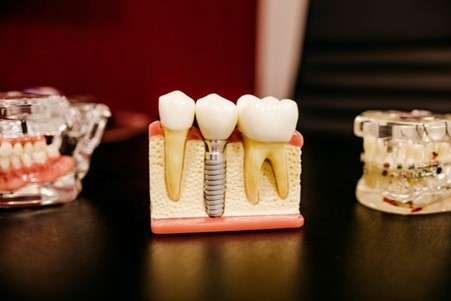You may have been told that dental implants will change your life, but do you know how true this is? Dental implants are excellent replacements for lost teeth, but knowing how long they actually last can be confusing and overwhelming.
Right now, you may have some questions. How long will dental implants truly last? Will they last a long time because they’re high-end and expensive, or will they last because they’re made of some special technology?
We’re happy to answer these questions and more. Keep reading to discover how long different types of dental implants last and why.
Endosteal Implants
Endosteal implants are a type of dental implant used to replace missing teeth. This type of implant is surgically placed into the jawbone and acts like a root, holding the prosthetic tooth in place.
Endosteal implants are considered a permanent solution to missing teeth and can last a lifetime with proper care. In general, with good oral hygiene and regular checkups, endosteal implants can easily last 15-20 years.
A study shows that implant-supported prostheses had an 88% success rate after 15 years of usage. The key to keeping endosteal implants lasting as long as possible is taking good care of your mouth through regular brushing and flossing and attending regular dental visits. Continuing to invest in your dental health can help your implants last a lifetime.
Subperiosteal Implants
Subperiosteal implants are an implant teeth option for people who have suffered from edentulism and have a minimal amount of jawbone. They consist of a metal frame that is placed on the jawbone and means which cross the gum creating posts.
This is not a permanent or long-lasting solution, but longevity depends on a few factors. Usually, subperiosteal implants can last up to 10 years with proper oral hygiene.
By using products such as gels and liquids with antibacterial agents, the implants can be flushed out of debris and bacteria. Additionally, a strict regimen of regular visits to the dentist, removal of tartar and plaque, and eating healthy is important to ensure their longevity. All these factors combined increase the chances of having subperiosteal implants last longer.
Zygomatic Implants
Zygomatic implants are a newer type of dental implant that are used to replace missing upper teeth due to significant bone loss or trauma. Zygomatic implants provide more stability and support than other types of dental implants.
They are also exceptionally long-lasting, often lasting up to 10 years or more with proper care and maintenance. The longevity of the implant depends on the type of implant used, the location it is placed in, and the health of the patient.
Regular dental visits and maintenance, along with proper oral hygiene, can help to ensure that your zygomatic implant lasts as long as possible. In general, zygomatic implants are highly successful and reliable and are a great option for patients who need a long-term solution for replacing missing upper teeth.
Learn More About Types of Dental Implants
In conclusion, dental implants are an effective solution for restoring missing teeth and usually last 10-15 years or more with proper care. Different types of dental implants can last for different amounts of time, so it is important to learn more about the types of implants that may be suitable for you.
Did you find this article helpful? Check out the rest of our blog for more!

